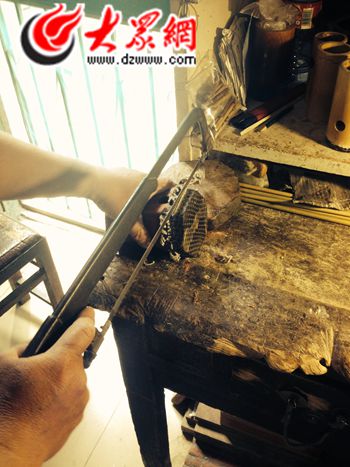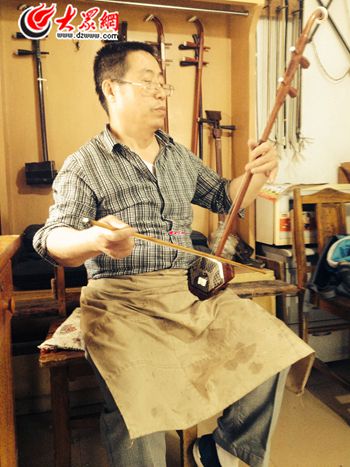source: Mao Dexun

Du Changjiang in the trimming

Du Changjiang is playing "the moon of the spring"
Volkswagen Ji'nan May 16th news (probation journalist Mao De) Hoon) speaking of the old Hu Qin handwork workshop in old Ji'nan, there were more than 80 at most in 40s and 50s twentieth Century, but after the vicissitudes of life, there is only one Duji in Ji'nan that Hu Qinpu still sticks to the tradition of making the piano. The public network reporter visited Du Ji Hu shop in May 14th. The Hu Qin shop has a history of a hundred years since the founding of the Republic of China. The 55 year old Du Changjiang is the third generation of Duji Hu Qinpu.
the old lane deep, the old shop
through the noisy Hibiscus street, to turn right less than one hundred meters is the quiet Qu Shui kiosk street, the leisurely spring from the alley through the flow, here, the old Ji'nan "home spring, household Yang Yang" reputation can be the best expression. The melodious sound came from the depths of the alley. Du Ji Hu Qin was paved on the obscure roadside.
Du Changjiang told Volkswagen reporter that the shop had just moved to Qu Shui Ting Street from the Gong Yuan Street two months ago. The cultural atmosphere of Qu Shui Ting Street was more strong. The people who loved traditional culture could get more people to understand the traditional musical instruments of Hu Qin.
Duji Hu Qinpu, founded in the Republic of China, has a history of more than 100 years. From the grandfather's family, he became an indissoluble bond with Hu Qin. Exquisite skills made Hu Qinpu famous old Ji'nan, at that time the seventy or eighty Qin shop in the top, before the liberation of Hu Qinpu, Du Ji in Du Changjiang's grandfather to the top of the cabinet, the Apprenticeship at the most than a dozen people, every day to buy the harp people in a continuous stream. After the liberation of
, due to the combination of public and private partnerships and the merger of all the harpshops in Ji'nan into musical instruments, Du Ji was no longer in existence as an independent shop, but continued to glow and fever as an important part of the musical instrument club. Until after the reform and opening up, the commune system of musical instruments did not exist, and the banners pulled up the banner to reopen. After 90s, China entered the era of industrialization, and the traditional old handicraft was declining. In the production of Hu Qin, other handworkshops were closed in succession.
reporter learned that after the cultural revolution, most old pianist entered the instrument factory, and the production of most of the instruments, such as Hu Qin, was transferred from traditional handcraft to machine mass production. Speaking of the decline of traditional Hu Qin production techniques, Du Changjiang's expression is somewhat desolate.
stick to the bottom line, fine chisel
Du Changjiang grind the harp with sand paper and say, "the handmade harp is more spiritual and the tone is the original flavor." The details of
Hu Qin show the earnest of the old pianist Du Changjiang. The choice of the material is very particular: Bamboo must be the bamboo of the Fujian Hunan. The bamboo is at least five years old, only the root is selected for use; the erhu piano is used to import the python from abroad. Snake skin, the cortex is strong and beautiful, the sound of the sound is the best; the binder of the bond skin and the harp is a precious Chinese medicine fish fish glue, its processing is more tedious, successively through cooking, boiling, drying, two times, the time needs to be three days less to complete, and the mechanical process. In less than a second, it can be completed by stamping with a jack, and the cost is much lower. Besides, the selection of materials such as strings, poles, axes and so on is also strives for perfection, making production processes more cumbersome.
when the reporter asked Du Changjiang the complexity of the process, the material was so rare, if he wanted to replace some chemical crafts, Du Changjiang said that his father had warned him of "the old cat on the roof, the generation of the generation", every tedious process has the truth, do the piano as a man, material. Choice must not be careless. Using chemical craftwork will affect the sound quality of the piano. Even if the cost is high, it can not replace the material easily.
no no succession, Hu Qin's
"go into this door and don't want to get out of this door." this is a reporter asking Du Changjiang if he has considered the answer to a higher income, starting from the age of six or seven to contact the industry. Remember to eat and sleep.
fifty years of perseverance is rooted in the deep love of the traditional culture. Du Changjiang picks up the erhu that hangs on the wall and pulls a erhu famous song, "the second spring moon", and brings a happy smile on his face when it comes to the rise. Du Changjiang is the third generation system pianist of the piano shop. Hu Qin, a famous pianist in a number of Beijing opera houses both inside and outside the province, is from his hands. Du Changjiang told reporters that because most young people now like popular art, they like the little traditional opera, and hand making Hu Qin is a job that needs to stand lonely. Sometimes one is sitting alone. One day, the income is only able to support the family, to get rich is very difficult, so far no apprenticeship, his only daughter is now working in an insurance company in Ji'nan, also did not pick up the family craft.
as the only existing handmade pianist in Ji'nan, Du Changjiang is worried and helpless for the present situation of unmanned inheritance. Now, most of the harp on the market is produced from the factory, which is the product of the large machine production. Du Changjiang said that in fact, there are many good things in the traditional culture that are worth young people to learn. I sincerely hope to see the tradition of making the heritage of Hu Qin, making more young people absorb nutrition from the traditional art...
related links
> br / > Hu Qin, a kind of piano Originated from the northern minorities, it is widely spread in China. Because of the different materials and shapes, Hu Hu, Jinghu, Nanhu, Banhu and four Hu are derived from the mother organ of Hu Qin. Good pronunciation, sound and sound. It can be used for Solo, ensemble or accompaniment to song and dance.